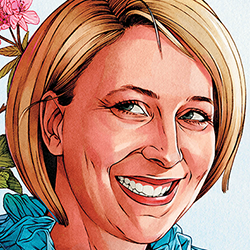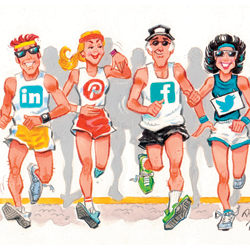|
REGISTRATION REQUIRED
insight
 Sell Check
You might not know it, but you spend 40 percent of your time selling. Author Daniel Pink argues that digital technology and the 21st century have turned us all into salespeople today. By Charles Pappas
From "hard sell" to "selling out" to "selling someone the Brooklyn Bridge," the act of selling is sometimes looked down on, at best, as a slightly embarrassing livelihood synonymous with used-car lots, multilevel marketing schemes, and sketchy real-estate deals. Daniel Pink, though, sees it through a less disparaging, more admiring lens. The author of seven books, Pink has brought his artisanal brew of big ideas, insightful data, and intimate stories to topics as diverse as perfect timing in life ("When"), what motivates us ("Drive"), and even the role remorse can play in guiding us toward wiser choices ("The Power of Regret"). But for exhibit marketers, his magnum opus may be "To Sell Is Human," which puts the art and science of selling in the spotlight it deserves. EXHIBITOR sat down with Pink to talk about why all of us from accountants to zookeepers (exhibit marketers, too) are really salespeople these days, and how the "Pixar pitch" is the new elevator pitch.
EXHIBITOR Magazine: You've argued that whether we're a teacher, an artist or – closer to home – an exhibit manager, we're almost all in sales. Was this always the case, or is this a recent phenomenon? Daniel Pink: It's a mix of both. Human beings have always been persuaders and influencers. Those abilities are adaptive. They help us survive. But they've become even more important in the 21st century because work has become less routine and more creative – and these abilities have crept closer to the center of many jobs. In my own research, I found that on average people are spending about 40 percent of their time on the job cajoling, convincing, and moving others. Job responsibilities have become less rigid and more elastic, and that often means even technical jobs require some measure of persuasive skill. More of us are going solo or becoming entrepreneurs, which demands sales skills. And an astonishing portion of job growth is in education and health care – what I call Ed-Med – which are inherently persuasive professions. What do teachers, counselors, physicians, and nurses do but try to convince people to change their behavior? EM: Why do we have such a stigma against sales? Is it rooted in Willy Loman and "Death of Salesman"? Patent medicine hucksters of the 19th century? The traveling salesmen jokes that I believe have been traced back to 13th-century Iceland. DP: I see your 13th century reference – and raise you the beginning of human civilization. For as long as there has been commerce, the governing condition has been information asymmetry. From the very first guy selling a goat in exchange for some shells, information asymmetry reigned. Sellers always had more information than buyers, often way more information. That gave sellers an edge – and that edge made us suspicious. Asymmetry is why we have, encoded in our laws and even our customs of commerce, the principle of "buyer beware." Buyers had to beware, because it was so easy for people of dubious ethics to rip us off. Of course, we no longer live in a world of information asymmetry. We are much closer to a world of information parity – a huge change. EM: We think of salespeople as possessing the ethics of the stereotypical used-car salesman. But don't studies show that successful salespeople score high for emotional intelligence? DP: Yes – especially in a world of information parity. I'll give you the best example. We believe that the best salespeople are strong extroverts. That's not what the evidence shows at all. In fact, strong extroverts are pretty bad at sales. They talk too much and listen too little. They're often too concerned about being liked. It's a total myth that strong extroverts are sales superstars. But strong introverts aren't any better. They're worse. The people who are the best at sales are ambiverts – they're somewhat extroverted and somewhat introverted. They're in the middle – and that gives them an advantage. They know when to speak up, but they also know when to shut up. They know when to push, but they also know when to hold back. The best news: Most of us are ambiverts. EM: How has sales changed in the digital age? Has it lessened the stigma or increased it? DP: It's become a different enterprise. We've gone from a world where buyers had little information, few choices, and no way to talk back. Now they've got lots of information, abundant choices, and all kinds of ways to talk back. The difference in sales in this environment is not a difference in degree – it's a difference in kind. It calls for a new approach and a fresh set of aptitudes. What becomes more important are abilities like taking another's perspective, curating information instead of accessing it, and finding hidden problems. EM: Do digital technologies – from email to Twitter to now the metaverse – make selling any easier? DP: The broad move to digital has made selling both easier and more challenging. It's easier because sellers can find more information on prospects to better identify their needs. They can also reach more prospects. But the real change is with buyers. They can enter the sales process armed with much more information. They can also spread the word quickly about unpleasant encounters, crappy service, and dodgy offerings. As for the metaverse, though, I remain skeptical. I'm not sure what problem it solves. There's nothing that it offers – at least right now – that makes my life easier, better, or more fulfilling. EM: Exhibitors often have a very small window of time to pitch to an attendee who stops in their booth. You've written about the Pixar pitch. Can you explain that? DP: This is a pitch, modeled after the narrative structure of a Pixar movie, built around six sentences: "Once upon a time, __________. Every day, ________. One day, ____________. Because of that, _________. Because of that, _____________. Until finally, ____________." For exhibitors, the first two sentences essentially describe the problem that prospects have. The third sentence introduces your offering as a way to redirect the story. The next two sentences show the knock-on effects of that intervention. And the final sentence shows the resolution. As with all things, the best way to determine whether it's effective is to experiment with it. Try it on a few visitors or in your collateral material – and see how it goes. EM: After researching and writing the book, do you find yourself acting differently now when someone tries to sell you something? DP: Absolutely. I take time to admire the craft. And I watch carefully – very carefully – to see if the person is just trying to sell me or is genuinely trying to serve me. For instance, I watch to see how often and aggressively the person tries to close. ("Do you want to make a deposit right now? I can send you the contract immediately.") I might still end up buying, but the process will leave a bad taste. And there are offerings I've bought that I wouldn't recommend to others in part because of this approach. The sales pitches I can't resist, though, are when the seller identifies a problem I didn't realize I had. That's huge. E
Books of Revelation
  The Power of Regret: How Looking Backward Moves Us Forward The Power of Regret: How Looking Backward Moves Us Forward Frank Sinatra admitted he had a few of them, but Daniel Pink unforgettably defines regret as the "photographic negative" of a life well lived. Based on intriguing surveys of the phenomenon of remorse, his book redefines regret as a tool that allows us to escape the tarpit of the past, so that we can approach a future more likely to end in confidence than self-reproach.  Drive: The Surprising Truth About What Motivates Us
Drive: The Surprising Truth About What Motivates Us One of the most common psychological cliches is that we are motivated by the pleasure of the carrot or the pain of the stick. Pink, however, ignores that cliche and, armed with 40 years of scientific investigation into the topic, reveals the core elements of true motivation – the autonomy to explore a subject, the opportunity to master it, and a way to apply the resulting expertise that instills us with purpose.  When: The Scientific Secrets of Perfect Timing
When: The Scientific Secrets of Perfect Timing "For everything there is a season..." starts the celebrated quote from Ecclesiastes. And for every work life there is a season too, of when to act and when to wait. Pink unravels the mystery of when to put what we know into action, because our lives are a nonstop loop of "when" decisions: when to look for a new job, find a new exhibit house, replace a staffer, or select a new show.
|
|
|
||||||||||||||||||||||||||||
|
|
||||||||||||||||||||||||||||
|
TOPICS Measurement & Budgeting Planning & Execution Marketing & Promotion Events & Venues Personal & Career Exhibits & Experiences International Exhibiting Resources for Rookies Research & Resources |
MAGAZINE Subscribe Today! Renew Subscription Update Address Digital Downloads Newsletters Advertise |
FIND IT Exhibit Producers Products & Services All Companies Get Listed |
EXHIBITORLIVE Sessions Exhibit Hall Exhibit at the Show Registration |
ETRAK Sessions Certification F.A.Q. Registration |
EDUCATION WEEK Overview Sessions Hotel Registration |
CERTIFICATION The Program Steps to Certification Faculty and Staff Enroll in CTSM Submit Quiz Answers My CTSM |
AWARDS Exhibit Design Awards Portable/Modular Awards Corporate Event Awards Centers of Excellence |
NEWS Associations/Press Awards Company News International New Products People Shows & Events Venues & Destinations EXHIBITOR News |
||||||||||||||||||||
|
||||||||||||||||||||||||||||






